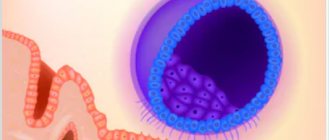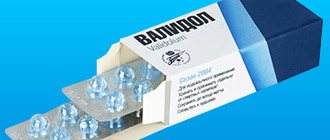Multivitamins
A pregnant woman needs more vitamins, and even a balanced diet during this period cannot fully satisfy the body’s need for vitamins and microelements. It is best to take multivitamin preparations designed specifically for pregnant women. A doctor will help you choose such a drug. However, if various complications occur during pregnancy, your doctor may prescribe you the following medications in addition to the multivitamins you take:
- folic acid - vitamin B9, which is recommended to be taken before the 12th week of pregnancy, because its deficiency can lead to anemia, blood clotting disorders, and fetal malnutrition. A sufficient amount of folic acid will ensure the correct formation of the fetal neural tube, from which the baby’s nervous system will then be formed;
- Vitamin E performs an important protective function in the body, fighting free radicals - metabolic products that destroy cells; in addition, it helps to relax the muscles of the uterus during pregnancy, thereby preventing its interruption;
- During pregnancy, the need for iron , because this microelement is part of hemoglobin, which ensures the delivery of oxygen to the body not only of the mother, but also of the fetus. It is quite difficult to satisfy this need by simply adjusting the diet;
- calcium ensures proper growth and formation of fetal bone tissue. If calcium is supplied in insufficient quantities from food, it is “taken” from the mother’s bones, which leads to a disruption of their structure - osteoporosis, deterioration of the condition of the teeth. Therefore, in some cases, pregnant women are recommended to take calcium supplements. Often such preparations also contain vitamin D, which helps improve the absorption of incoming calcium.
Your doctor will determine the right dosage and duration of taking these medications, because they are individual for each woman and depend on the severity of pregnancy complications.
Non-drug methods
Given the small choice of medications for relieving headaches during pregnancy, it is worth giving preference to alternative methods.
Massage
It has been proven that running your fingers from the frontal part of the head to the back of the head (in one direction only) helps eliminate stagnation of venous blood in the sinuses of the brain. This is explained by the presence of perforating veins on the surface of the head, which are connected to the venous sinuses.
Such a massage for 15 minutes can significantly reduce pain, even eliminating it completely.
For more information on how to get rid of headaches with massage, watch the video:
Neck massage
It is especially effective if your head hurts due to osteochondrosis of the cervical spine. After all, the vertebral arteries pass through the cervical region, compression of which can cause excruciating pain in the head.
Reflexology
Impact on certain points of our body leads to the activation of certain physiological processes. So, for headaches, light pressure on the temporal areas on both sides is effective; you can use light massaging movements in a clockwise direction.
Doctor's advice
Neck massage can only be done in the form of light pressure on the muscles, stroking, and in no case too much. Firstly, movements with intense pressure will cause muscle pain. Secondly, there is always the possibility of a hernia, massage in which is done very carefully.
Victoria Druzhikina Neurologist, Therapist
Pressing on the following points will help relieve headaches: at the base of the inner edge of both eyebrows, the center of the superciliary arches (the exit point of the supraorbital nerve), the middle of the bridge of the nose, the point between the base of the 1st and 2nd fingers of both hands. You need to gently press on each point for 2-3 minutes.
Drinking strong tea with sugar
It is effective to drink a cup of strong tea for headaches associated with low blood pressure. Coffee drinks should not be consumed during pregnancy, as caffeine can cause increased heart rate. Use caution in case of diabetes mellitus and gestational diabetes mellitus, which is common among pregnant women.
Normalization of the daily routine
If a pregnant woman often has headaches, she needs to adjust her daily routine. Normalizing sleep and rest is very important. For example, walking for 15 minutes before bed is very beneficial. Pain will become much less of a problem if you pay due attention to rest.
Taking a warm shower
Promotes relaxation and improves blood circulation in the body.
You should not get carried away with aromatherapy, as some essential oils can cause an allergic reaction.
There are currently at least 50 known reasons why a headache may occur. During pregnancy, the most common are tension headaches, as well as headaches that occur when pressure rises (for example, with severe gestosis).
Despite such a wide range of drugs available on the pharmacological market, during pregnancy their choice is extremely limited. Therefore, during the period of bearing a child, before taking this or that medicine, it is necessary to find out the cause of the headache.
Unsystematic use of pills can negatively affect the baby's development. We must not forget about the serious causes of headaches (vascular aneurysm, pathological tortuosity, space-occupying brain formations). A consultation with a gynecologist and therapist will help you understand the mechanisms of pain, as well as prescribe the necessary medication.
This article has been verified by a current qualified physician, Victoria Druzhikina, and can be considered a reliable source of information for site users.
Bibliography
1. https://www.mediasphera.ru/issues/zhurnal-nevrologii-i-psikhiatrii-im-ss-korsakova/2015/11/downloads/ru/591997-729820151118 2. https://journals.eco-vector .com/RFD/article/viewFile/1431/1051
Rate how helpful this article was
2.5 4 people voted, average rating 2.5
Did you like the article? Save it to your wall so you don’t lose it!
No-shpa
This is an antispasmodic drug that is used during pregnancy to increase the tone of the uterus. The effect of the drug is based on relaxation of the muscle muscles of the uterus. Clinical studies have proven that no-spa does not have an adverse effect on the fetus. Doctors recommend having this drug with you and using it if there are signs of increased uterine tone (painful sensations in the abdominal area, when the uterus becomes hard and dense and does not relax for a long time). It is recommended to take no more than 6 tablets of no-shpa per day. Before you start taking no-shpa, you should consult your doctor, since this drug cannot be taken if you have symptoms of isthmic-cervical insufficiency.
Indications for use during pregnancy
No-shpa forte - tablets
We can say with confidence that No-Shpa does not cause any harm to the child and is one of the safest antispasmodics, so it should be present in the home medicine cabinet of every expectant mother. This drug relieves spasms of smooth muscles, so it is prescribed for hypertonicity of the uterus and even when there is a threat of miscarriage.
It helps reduce abdominal pain in the first trimester and can be used for various disorders of the digestive tract. Main indications for use of No-Shpa:
- Intestinal colic, manifested by abdominal pain. They can occur due to poor nutrition, but sometimes they are a consequence of hormonal changes in the body during pregnancy. No-spa will reduce pain and relieve discomfort; the drug reaches its maximum effect within half an hour after administration.
- Chronic inflammation of the stomach and duodenum, as well as peptic ulcer. No-Spa makes it possible to stop pain if it is associated with the occurrence of spasms.
- Dyskinesia of the biliary tract with increased tone. No-Spa normalizes motor skills and the pain will stop.
- Inflammation of the gallbladder (cholecystitis). No-Shpu is prescribed for a chronic disease, but not during an exacerbation.
In addition, the drug allows you to eliminate cervical spasms, as well as relieve abdominal cramps after any surgical interventions. Contraindications include hypersensitivity to the components of the drug, low blood pressure, renal and liver failure. Isthymic-cervical insufficiency is also a contraindication, so if you are diagnosed with this, you will have to choose other types of antispasmodics.
No-Spa relieves spasms, but does not eliminate the cause of their occurrence, so if you experience recurring pain, you should consult a doctor. If you do not know the true cause of abdominal pain, it is advisable to consult a specialist as soon as possible.
Drugs for the treatment of hemorrhoids
Constipation that often occurs during pregnancy can provoke the development of hemorrhoids - varicose veins of the anus and rectum in the form of painful nodes and lumps that begin to bleed during bowel movements. You can use rectal suppositories and Gepatrombin , suppositories with novocaine after 12 weeks of pregnancy. While taking these medications, the hemorrhoids will become smaller and the pain will go away. In addition, hepatrombin will also have a preventive effect: its use sharply reduces the risk of relapse of the disease.
Headache in pregnant women
Tension headache (TTH) during pregnancy often occurs against the background of migraine, but does not cause severe discomfort to the woman requiring immediate treatment. Most often, TTH is caused by insomnia, especially in the last weeks of pregnancy, physical fatigue and toxicosis. To eliminate them, in most cases, adequate rest and sleep is sufficient.
Migraines during pregnancy are variable. In some cases, it begins simultaneously with pregnancy and disappears without a trace after childbirth. The most severe attacks occur in the first trimester; in the second and third, the intensity and frequency of migraine decreases until it disappears completely. In cases where women suffered from severe migraine attacks before pregnancy, after conception a decrease in the frequency of attacks is noted until their complete disappearance.
Headache during pregnancy can be a symptom of serious complications - gestational diabetes, preeclampsia.
Diabetes in pregnant women can develop asymptomatically and manifest itself as persistent mild headaches, increased urination, and itching of the genitals. For timely diagnosis of the disease, all pregnant women undergo a blood glucose test every 2 months.
The main symptom of preeclampsia is a significant increase in blood pressure, which is often accompanied by an intense headache with vomiting, which is often confused with a migraine. If such a headache occurs in the third trimester, the pregnant woman is immediately hospitalized.
Diagnosis of headaches during pregnancy is carried out if:
- A pregnant woman suddenly experienced severe pain.
- Headaches intensified and became more frequent during pregnancy.
- The pain is accompanied by additional symptoms - vomiting, nausea, fever, convulsions, loss of consciousness, increased blood pressure and increased urination.
The main feature of the treatment of headaches in pregnant women is the impossibility of prescribing most drugs due to their negative impact on the health of the mother and the development of the fetus (of the analgesics, only paracetamol can be used). For this reason, non-drug methods for treating headaches are primarily used:
- Elimination of factors that cause headaches - foods, drinks, situations.
- You need to drink at least 1.5-2 liters of water per day.
- Rest when you feel tired.
- During a headache attack, it is advisable to sleep or relax in a quiet, darkened room.
Author: K.M.N., Academician of the Russian Academy of Medical Sciences M.A. Bobyr
7.Oxolinic ointment
To prevent ARVI and influenza**, especially during epidemics, you can use a product such as Oxolinic ointment . It is placed in a small amount into the nose, lubricating its mucous membrane. The action of oxolinic ointment is based on the fact that it prevents the introduction of the virus. It is recommended to use oxolinic ointment before planning to visit crowded places, as well as in the autumn-winter period. You can use Vitaon .
Why does my head hurt?
During pregnancy, all organs and systems go into increased work mode. At the same time, the expectant mother often experiences worries about her unborn child. Against this background, headaches develop. There are several reasons for their occurrence:
- increased blood pressure -
may be associated with an existing chronic disease or with fluid retention in later stages; - severe weight gain -
during pregnancy, weight gain should occur gradually, observing certain standards, in order to prevent too much stress on the blood vessels, including the brain; - low blood pressure -
occurs due to chronic diseases or redistribution of blood from the upper parts of the body to the lower parts: to the uterus; - lack of nutrients -
the need for vitamins and minerals in pregnant women increases several times, so they are advised to take them additionally; - stress -
pregnant women often experience anxiety about their condition or anxiety about their unborn child; - chronic pathologies -
ARVI, osteochondrosis, damage to the kidneys and eyes can lead to increased pressure, temperature or pinching of nerve endings, which provokes pain; - weather change -
pregnant women often become weather-sensitive and have a hard time experiencing changes in air temperature or pressure.
A doctor can determine the cause of headaches. To do this, a pregnant woman needs to come to her gynecologist and get a referral from him for an examination or consultation with a specialist.
8. Soothing agent
In the first half of pregnancy, given the peculiarities of changes in the excitability of the nervous system, for example, increased tearfulness, irritability, and in the second half of pregnancy, given frequent insomnia, you may need a sedative . In this capacity, we can recommend Valerian and Motherwort (they can be used in the form of tablets, extracts, decoctions of dry herbs). You can use the drug Novopassit , which is based on herbs and does not contain alcohol.
Diagnostics
Complaints of pain in the head are considered by doctors as a subjective sensation of the patient. To find the cause of this condition and prescribe appropriate therapy, you need to conduct a diagnosis. If you have a headache during pregnancy, women are prescribed:
- blood pressure control -
allows you to notice a tendency to increase or decrease it; - a general blood test
will show the presence of an inflammatory or infectious process; - general urine test -
will indicate the presence of pathology of the excretory system; - EEG -
a study of the electrical activity of the brain will reveal damage to the nervous system; - Ultrasound of cerebral vessels -
detects vascular pathologies; - MRI of the cervical vertebrae (except for the 1st trimester)
will show osteochondrosis.
After a full examination, the doctor selects an individual treatment regimen in accordance with the stage of pregnancy and the presence of chronic diseases. Self-prescription of medications is unacceptable and can lead to complications.
10.Headache remedies
The question often arises: can a pregnant woman take medications for headaches ? It should be remembered: enduring a headache is much more harmful than taking painkillers (of course, if the headache is not regular, but occasional). If you are experiencing frequent, painful headaches, they may indicate the development of some disease, and you should consult your doctor.
If a similar reason is excluded, you can take a painkiller . The most studied effects on a pregnant woman and fetus are paracetamol and drugs based on it (for example, Panadol ). In small doses or for a short period of treatment, it does not have a negative effect on the fetus.
Headache medications you can take during pregnancy
Antispasmodics
Often the cause of pain can be a spasm of blood vessels in the brain, neck muscles or the back of the head.
In such cases, products that contain substances that relax the walls of blood vessels are effective. Due to this, the diameter of the vessels increases and blood circulation is normalized.
It is important to know that this group of drugs is effective for tension headaches.
Antispasmodics are the safest group of painkillers during pregnancy.
“No-spa” (“Drotaverine”) is a drug that helps relax smooth muscle cells. This drug affects not only the walls of blood vessels, but also the cells of the intestines, biliary system, urinary system, and uterus. It is for this reason that “No-spa” is successfully used during pregnancy with increased uterine tone.
Thanks to numerous studies, it has been revealed that this medicine does not have a negative effect on the fetus and does not cause developmental defects.
Application should be in acceptable therapeutic doses, since exceeding the dosage may lead to side effects:
- Decreased blood pressure (to the point of fainting).
- Heart rhythm disturbances (increased heart rate).
- The emergence of a tendency to constipation (due to decreased intestinal motility).
Contraindications for use are individual sensitivity to the active substance, hypotension from 90/60 mmHg. and below, tachycardia from 110 beats/min.
Combined antispasmodic analgesics, which in addition to the antispasmodic component contain another active ingredient - an analgesic, are prohibited for use during pregnancy. Such drugs include “Spazmalgon”, “Andipal”.
Medicines that lower blood pressure
One of the causes of headaches is increased blood pressure. For pregnant women, this situation is most relevant for a number of reasons:
- an increase in circulating blood volume during gestation by almost 40%;
- the development of gestosis, which is characterized by increased pressure, as well as fluid retention in the body;
- increased load on the cardiovascular system;
- exacerbation of existing chronic kidney and heart diseases.
Increased pressure is manifested by pain, most pronounced in the occipital region. There may be a feeling of heaviness in the head, flashing “spots before the eyes.”
Among the approved centrally acting antihypertensive drugs, they include (“Dopegit”) and a solution of “Magnesium sulfate” (“Magnesia”).
"Dopegit" acts on alpha-adrenergic receptors located in the brain.
It can be used during pregnancy for a number of reasons:
- There is no negative effect on fetal development.
- Adequate uteroplacental blood flow is maintained.
"Magnesia". When a pregnant woman experiences a headache associated with high blood pressure, the Magnesium sulfate solution is highly effective. In addition, it is a tocolytic (reduces the tone of the uterus), promotes the removal of fluid from the body (with edema).
This medicine is successfully used in obstetrics; it is especially necessary if a pregnant woman has gestosis, as it affects many parts of the pathogenesis.
The main route of administration is intravenous infusion, less often intramuscularly.
If necessary, tablet magnesium preparations (Magnerot, Magnelis, Magne-B6) are prescribed. Their effect appears gradually, the duration of therapy ranges from 10 to 30 days.
Preparations based on paracetamol
This group of medications can relieve pain of moderate intensity without harming the condition of the fetus.
The drug penetrates the placental barrier, but according to studies, Paracetamol does not have a toxic or teratogenic effect (does not cause developmental abnormalities) on the fetus. It should be remembered that the use of this drug should be limited.
Analogues of Paracetamol are Panadol, Efferalgan.
Antihistamines
During pregnancy, due to changes in immune status, there is a high probability of experiencing certain allergic reactions, even if you have never encountered this disease before. In this case, such well-known drugs as Suprastin, Claritin .
In conclusion, let us remind you: you can use any medications only after consulting a doctor and with extreme caution - up to 12 weeks of pregnancy.
Nadezhda Zaretskaya
Obstetrician-gynecologist, candidate of medical sciences, doctor of the highest category
Magazine “9 months” No. 7 2003
Headache during pregnancy
When to go to the doctor?
Headaches in later stages often indicate high blood pressure. This condition is dangerous and requires specialist intervention. Immediate assistance is provided when protein is detected in the urine, which indicates preeclampsia. A doctor's examination is required if:
- persistent migraines, increasing pain intensity;
- decreased sensitivity, spasms, deterioration of visual and auditory perception;
- headaches immediately after waking up;
- pressure surges accompanied by discomfort, dizziness
What can you do for a headache?
There are a number of medications that women can take for different periods of time. Self-medication in this case is excluded; medications are prescribed only by a doctor. What can you do to relieve headaches during pregnancy? First of all, ensure yourself proper rest, healthy sleep, and walks in the fresh air. Also recommended:
- Make an appointment with a physical therapist or osteopath if you suspect excessive muscle tension in the neck.
- Do not neglect special gymnastics.
- Stick to regular meals. It is recommended to divide the diet into small portions and eat food frequently.
- During attacks, apply warm or cool compresses (depending on the type of pain).
Medicines
Severe headaches during pregnancy can be eliminated with medications prescribed by a doctor. Paracetamol is often prescribed. However, in large doses it is dangerous, and therefore, even with intense pain, you cannot dose the drug yourself. Ibuprofen is prescribed no later than 30 weeks of pregnancy. The drug can cause premature closure of the fetal ductus arteriosus if taken late in pregnancy. Combination drugs are not recommended. Anti-migraine drugs with triptans have an abortifacient effect.
Prevention of headaches in the early stages
It is important to resort to activities that prevent attacks. If the patient suffers from migraines, then headaches in the early stages of pregnancy may occur due to the consumption of cheese, chocolate, products containing monosodium glutamate, and dyes. They must be excluded from the diet. Eat with caution:
- nuts;
- chicken liver;
- sausages.
Fractional meals are useful not only for the gastrointestinal tract, it also prevents headaches, since they are often provoked by a feeling of hunger. If it is not possible to have a full lunch, it is recommended to have fruits and biscuits with you.
During pregnancy, headaches often appear due to overexertion. It is necessary to normalize your sleep pattern, but not to increase its duration too much, since there is a concept of “weekend pain.” Pregnant women working at a table or machine need to take a break every 30 minutes, warm up, and go out into the fresh air. Avoid:
- strong odors;
- loud sounds (TV, concert, noisy companies);
- long exposure to cold or heat.
Professional help
If you do not know what to do with headaches during pregnancy, seek qualified help from specialists. Doctors will identify the root cause of the pain. If the situation allows, a treatment regimen will be prescribed. Medicines that relieve symptoms are also selected if therapy is not currently recommended due to pregnancy. It is important to remember that self-prescribing medications can lead to the formation of fetal malformations. For example, aspirin and its derivatives lead to heart defects and lower jaw defects. By contacting specialists, you receive: attentive and polite service, individual selection of medications based on the characteristics of fetal development and individual response to medications, condition monitoring until complete recovery.
Sources
- Bacso SA., Nilsen ES., Silva J. How to turn that frown upside down: Children make use of a listener's facial cues to detect and (attempt to) repair miscommunication. // J Exp Child Psychol - 2021 - Vol207 - NNULL - p.105097; PMID:33756278
- Aseeri S., Interrante V. The Influence of Avatar Representation on Interpersonal Communication in Virtual Social Environments. // IEEE Trans Vis Comput Graph - 2021 - Vol27 - N5 - p.2608-2617; PMID:33750710
- Langland-Hassan P., Faries FR., Gatyas M., Dietz A., Richardson MJ. Assessing abstract thought and its relation to language with a new nonverbal paradigm: Evidence from aphasia. // Cognition - 2021 - Vol211 - NNULL - p.104622; PMID:33601019
- Anikin A., Pisanski K., Reby D. Do nonlinear vocal phenomena signal negative valence or high emotion intensity? // R Soc Open Sci - 2021 - Vol7 - N12 - p.201306; PMID:33489278
- Hamilton MB., DeThorne L. Volume and Verve: Understanding Correction/Behavioral Warnings in Teacher-Child Classroom Interactions Involving an African American Kindergarten Student. // Lang Speech Hear Serv Sch - 2021 - Vol52 - N1 - p.64-83; PMID:33464973
- Schmitz L., Knoblich G., Deroy O., Vesper C. Crossmodal correspondences as common ground for joint action. // Acta Psychol (Amst) - 2021 - Vol212 - NNULL - p.103222; PMID:33302228
- Ramos-Cabo S., Vulchanov V., Vulchanova M. Different Ways of Making a Point: A Study of Gestural Communication in Typical and Atypical Early Development. // Autism Res - 2021 - Vol - NNULL - p.; PMID:33241639
- Altmann U., Brümmel M., Meier J., Strauss B. Movement Synchrony and Facial Synchrony as Diagnostic Features of Depression: A Pilot Study. // J Nerv Ment Dis - 2021 - Vol209 - N2 - p.128-136; PMID:33214386
- Talkington WJ., Donai J., Kadner AS., Layne ML., Forino A., Wen S., Gao S., Gray MM., Ashraf AJ., Valencia GN., Smith BD., Khoo SK., Gray SJ ., Lass N., Brefczynski-Lewis JA., Engdahl S., Graham D., Frum CA., Lewis JW. Electrophysiological Evidence of Early Cortical Sensitivity to Human Conspecific Mimic Voice as a Distinct Category of Natural Sound. // J Speech Lang Hear Res - 2021 - Vol63 - N10 - p.3539-3559; PMID:32936717










